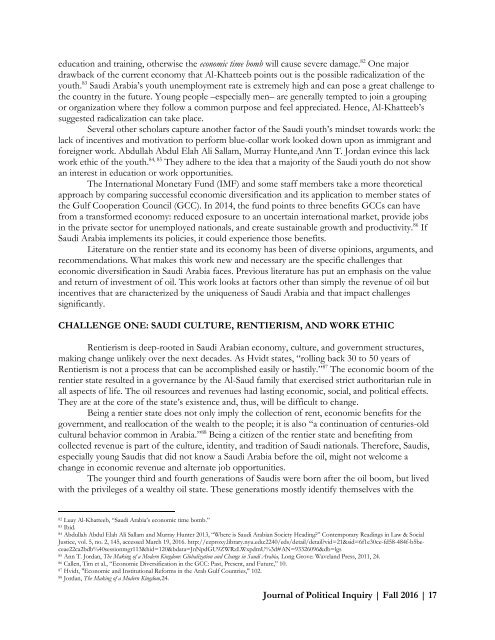Fall2016_Final2
You also want an ePaper? Increase the reach of your titles
YUMPU automatically turns print PDFs into web optimized ePapers that Google loves.
education and training, otherwise the economic time bomb will cause severe damage. 82 One major<br />
drawback of the current economy that Al-Khatteeb points out is the possible radicalization of the<br />
youth. 83 Saudi Arabia’s youth unemployment rate is extremely high and can pose a great challenge to<br />
the country in the future. Young people –especially men– are generally tempted to join a grouping<br />
or organization where they follow a common purpose and feel appreciated. Hence, Al-Khatteeb’s<br />
suggested radicalization can take place.<br />
Several other scholars capture another factor of the Saudi youth’s mindset towards work: the<br />
lack of incentives and motivation to perform blue-collar work looked down upon as immigrant and<br />
foreigner work. Abdullah Abdul Elah Ali Sallam, Murray Hunte,and Ann T. Jordan evince this lack<br />
work ethic of the youth. 84, 85 They adhere to the idea that a majority of the Saudi youth do not show<br />
an interest in education or work opportunities.<br />
The International Monetary Fund (IMF) and some staff members take a more theoretical<br />
approach by comparing successful economic diversification and its application to member states of<br />
the Gulf Cooperation Council (GCC). In 2014, the fund points to three benefits GCCs can have<br />
from a transformed economy: reduced exposure to an uncertain international market, provide jobs<br />
in the private sector for unemployed nationals, and create sustainable growth and productivity. 86 If<br />
Saudi Arabia implements its policies, it could experience those benefits.<br />
Literature on the rentier state and its economy has been of diverse opinions, arguments, and<br />
recommendations. What makes this work new and necessary are the specific challenges that<br />
economic diversification in Saudi Arabia faces. Previous literature has put an emphasis on the value<br />
and return of investment of oil. This work looks at factors other than simply the revenue of oil but<br />
incentives that are characterized by the uniqueness of Saudi Arabia and that impact challenges<br />
significantly.<br />
CHALLENGE ONE: SAUDI CULTURE, RENTIERISM, AND WORK ETHIC<br />
Rentierism is deep-rooted in Saudi Arabian economy, culture, and government structures,<br />
making change unlikely over the next decades. As Hvidt states, “rolling back 30 to 50 years of<br />
Rentierism is not a process that can be accomplished easily or hastily.” 87 The economic boom of the<br />
rentier state resulted in a governance by the Al-Saud family that exercised strict authoritarian rule in<br />
all aspects of life. The oil resources and revenues had lasting economic, social, and political effects.<br />
They are at the core of the state’s existence and, thus, will be difficult to change.<br />
Being a rentier state does not only imply the collection of rent, economic benefits for the<br />
government, and reallocation of the wealth to the people; it is also “a continuation of centuries-old<br />
cultural behavior common in Arabia.” 88 Being a citizen of the rentier state and benefiting from<br />
collected revenue is part of the culture, identity, and tradition of Saudi nationals. Therefore, Saudis,<br />
especially young Saudis that did not know a Saudi Arabia before the oil, might not welcome a<br />
change in economic revenue and alternate job opportunities.<br />
The younger third and fourth generations of Saudis were born after the oil boom, but lived<br />
with the privileges of a wealthy oil state. These generations mostly identify themselves with the<br />
82<br />
Luay Al-Khatteeb, “Saudi Arabia’s economic time bomb.”<br />
83<br />
Ibid.<br />
84<br />
Abdullah Abdul Elah Ali Sallam and Murray Hunter 2013, “Where is Saudi Arabian Society Heading?” Contemporary Readings in Law & Social<br />
Justice, vol. 5, no. 2, 145, accessed March 19, 2016. http://ezproxy.library.nyu.edu:2240/eds/detail/detail?vid=21&sid=6f1e30ce-fd58-484f-b5beceae22ca2bdb%40sessionmgr113&hid=120&bdata=JnNpdGU9ZWRzLWxpdmU%3d#AN=93326096&db=lgs<br />
85<br />
Ann T. Jordan, The Making of a Modern Kingdom: Globalization and Change in Saudi Arabia, Long Grove: Waveland Press, 2011, 24.<br />
86<br />
Callen, Tim et al., “Economic Diversification in the GCC: Past, Present, and Future,” 10.<br />
87<br />
Hvidt, "Economic and Institutional Reforms in the Arab Gulf Countries," 102.<br />
88<br />
Jordan, The Making of a Modern Kingdom,24.<br />
Journal of Political Inquiry | Fall 2016 | 17
















